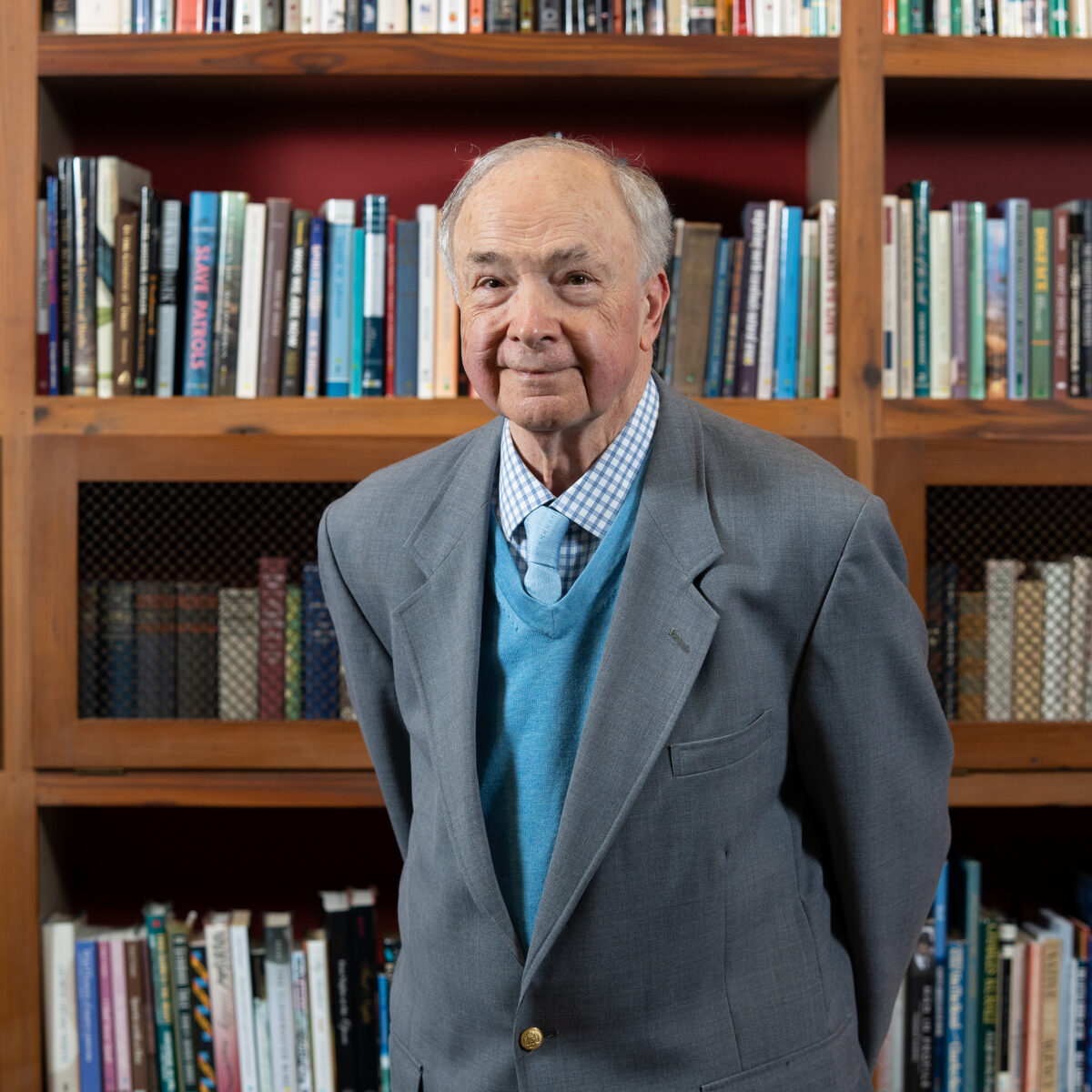Gary Koch '68 (PhD), Faculty Service Award citation
Posted on April 22, 2024
Gary Koch ’68 (PhD). Photo by Ray Black III
In the 1960s and ’70s, Gary Koch ’68 (PhD) held de facto office hours in the cafeteria at The Carolina Inn. At breakfast, lunch and sometimes dinner, he’d take a seat at one of the big round tables. Biostatistics grad students would pull up seats, asking him questions about collaborative statistical practice and methodology research, and analytical methods for working with categorized data. Koch has a super-human capacity to hold vast amounts of information in his brain, former students say. When his guidance involved theorems or proofs, he’d sometimes stop mid-equation and gently suggest to an enrapt student, “You might consider writing some of this down.”
If they came unprepared, without a notepad and pen, he’d smooth out a paper napkin and sketch out a framework on how to approach the problem. Students would leave with a carefully folded napkin of insights to decipher later.
Koch (pronounced Cook) is an internationally acclaimed expert in providing analytical methods for working with categorized data, outcomes that are yes or no, or ordered from unfavorable to favorable. His methods have real-world applications for other researchers. His contributions to statistical methodology grow the more others apply them. A brilliant theoretician, he prefers to use his knowledge to solve practical problems. Early in his career, he worked on the use of seat belts to improve highway safety, not inherently alluring as a conversational topic but extremely important in saving lives.
The manual Koch co-wrote in 1995, Categorical Data Analysis Using SAS, combines many of his methodologies with Statistical Analysis System computing procedures and is still used as a textbook. He developed the school’s course in categorical data analysis, which he still teaches.
Koch came to Carolina on the recommendation of a mentor at his alma mater, The Ohio State University. Born and raised in the small town of Mount Vernon, Ohio, he chose not to follow in his physician father’s footsteps but opted for biostatistics, using his math aptitude to help patients by applying his work to pharmaceuticals and public health. He could access the real world faster with a doctorate versus a medical degree, he said, and a fellowship and assistantship paid his grad school expenses.
He joined the faculty of UNC’s biostatistics department in 1967, shortly before he completed his doctorate. Fifty-seven years later, he’s still supervising and mentoring graduate students and directing UNC’s Biometrics Consulting Lab, which he created. He keeps in touch with his former students as they apply and build on his work. Some of his students have retired before he has. Every time he thinks about retiring, another student seeks his mentorship.
In the 1970s, Koch collaborated with fellow statistician and UNC professor Dennis Gillings on what would become the contract research firm Quintiles, which grew into a multibillion-dollar company. But when he had to make a choice — stay in academia or devote his career to developing the business — he chose to continue his collaborations with other researchers and mentor future generations.
The awards and recognitions Koch has received number in the dozens. He garnered honors in his 30s that many in his field don’t earn until their 50s. Early in his career, he was named a fellow of the American Statistical Association, president of the Biometric Society and an editor of leading professional journals. In 1996, he received an honorary doctorate from De Montfort University in the U.K. His UNC honors include the 1992 McGavran Award for Excellence in Teaching, the 2007 John E. Larsh Jr. Award for Mentorship and the 2012 Bernard G. Greenberg Alumni Endowment Award for contributions to the field.
Faculty in any department can be quite competitive, and sometimes graduate students absorb that tension. Koch’s generosity with his time, expertise and willingness to collaborate made the biostatistics department a more welcoming place. He even organized a softball team, appointing himself as a pitcher. At 6 foot 5 inches, he lobbed balls high over the plate, causing batters to hit pop-ups, making it easy for his teammates to catch.
Gary has a deep knowledge of sports. He knows the stats — of course — and is an avid Tar Heel fan. He’d squeeze in dissertation consults with students at halftime in Kenan Stadium. One former student said if Koch hadn’t gone into biostatistics, he would have made an excellent sports commentator.
Many former students talk about how Koch supported them through personal trials as well as mentoring them in their research and careers. He could usually find a part-time position on or off campus for a student struggling financially. He could relieve stress with a belly laugh so raucous others would join in without knowing why.
Koch loves to drive. In the days before GPS or Google Maps, he had a road atlas in his head. When students mentioned a trip to their hometown or a conference, he’d come up with the most efficient route and could tell them the best place for breakfast in a number of cities.
Though The Carolina Inn no longer has a cafeteria, Koch still makes himself available to help students and colleagues. He’s currently helping a former student with a book, advising, reading drafts and editing. These days he’s claimed a table at a local coffee shop where he’s an early morning regular. When he’s not unpacking theorems, he’s happy to dissect the previous night’s game.
The Faculty Service Award is presented by the Carolina Alumni Board of Directors.
